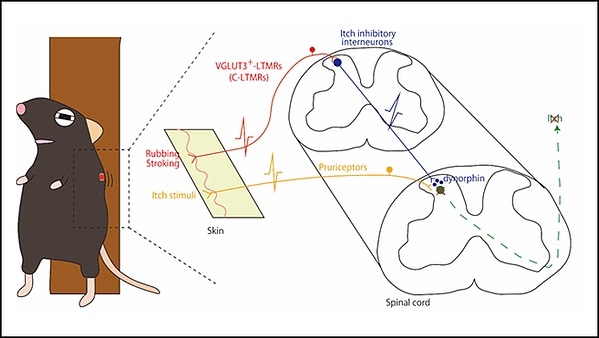Stop scratching: rubbing skin activates an anti-itch pathway in the spinal cord, according to research in mice recently published in JNeurosci.

It can be hard to resist the relief of scratching an itch, even though scratching damages skin, especially in sensitive areas like the eyes. But stroking can relieve an itch, too. Sakai et al. investigated the neural pathway behind this less-damaging form of itch relief.
The research team triggered the urge to scratch in mice by administering an itch-inducing chemical underneath their skin. The team then recorded the electrical response from dorsal horn neurons in the spinal cord while they stroked the animals’ paws. The neurons fired more often as the mice were stroked and less often after the stroking ended. These neurons respond to both touch and itch, so the increase corresponds to the added touch, not increased itchiness, while the decrease corresponds to itch relief. The same decrease could be seen when the team directly stimulated touch-sensing neurons under the skin. However, inhibiting both sensory neurons and a subtype of anti-itch interneurons in the spinal cord failed to decrease the response from dorsal horn neurons, while activating sensory neurons stopped the mice from scratching. The results show that stroking sets off a cascade, activating sensory neurons under the skin that then activate anti-itch interneurons in the spinal cord, resulting in reduced dorsal horn neural activity and itch relief.
Source:
Journal reference:
Sakai, K., et al. (2020) Low-threshold mechanosensitive VGLUT3-lineage sensory neurons mediate spinal inhibition of itch by touch. Journal of Neuroscience. doi.org/10.1523/JNEUROSCI.0091-20.2020.